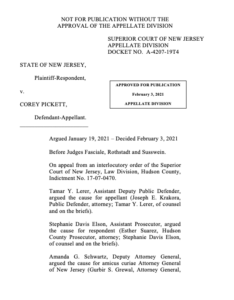 A recent decision by the Superior Court of New Jersey, Appellate Division held that the proprietary source code underlying DNA analysis software TrueAllele may be examined by an independent expert in advance of a hearing on admissibility. The opinion aligns with the position advocated by the Clinic in its October amicus brief on behalf of Upturn, Inc., a DC-based nonprofit organization promoting technology equity. The decision is a victory for defendants’ rights and due process in a developing area of criminal law.
A recent decision by the Superior Court of New Jersey, Appellate Division held that the proprietary source code underlying DNA analysis software TrueAllele may be examined by an independent expert in advance of a hearing on admissibility. The opinion aligns with the position advocated by the Clinic in its October amicus brief on behalf of Upturn, Inc., a DC-based nonprofit organization promoting technology equity. The decision is a victory for defendants’ rights and due process in a developing area of criminal law.
In the underlying criminal case, the State of New Jersey attempted to introduce DNA evidence against defendant Corey Pickett. The DNA evidence was analyzed with TrueAllele, a software purporting to analyze particularly complex DNA samples not suitable to more traditional methods. The State had requested a Frye hearing, where it would argue that TrueAllele was generally accepted as reliable within the scientific community. However, it sought to do so without giving Pickett access to the TrueAllele source code. In response, Pickett sought to compel disclosure of the source code under a protected order, meaning the defense’s expert would be sworn to secrecy but would still be able to evaluate TrueAllele’s reliability. The trial court denied the motion, but the Appellate Division granted leave for an immediate appeal.
The issue on appeal was whether Pickett was entitled to developer Cybergenetics’s trade secrets (specifically, the software underlying TrueAllele) in order to challenge the reliability of its probabilistic genotyping system. Pickett sought to have an independent expert examine and test TrueAllele’s code, in order to effectively cross-examine the State’s expert at a Frye hearing. The test for admissibility of scientific evidence at such a hearing is whether such evidence is “generally accepted” by the relevant scientific community. Judge Fasciale found that full access to the software in question was directly relevant to assessing that question, the alternative being unconditional acceptance of Cybergenetics’s assertions of reliability.
The court held that if the State’s expert relies on “novel probabilistic genotyping software” to give DNA testimony, a defendant is entitled, upon a showing of particularized need, to access the software’s source code, supporting development, and related documentation to challenge the software’s reliability as well as the prosecution’s expert testimony at a Frye hearing. In evaluating whether particularized need exists, the court instructed that trial judges should follow a multi-factor balancing test, considering (1) whether a rational basis exists for the production order; (2) specificity of the desired information; (3) ability to safeguard the company’s intellectual property; and (4) other case-specific factors. The Appellate Division went on to hold that, in this case, Pickett met that showing of particularized need.
In issuing its opinion, the court recognized the nascent nature of probabilistic genotyping. The opinion noted that, per the advice of the President’s Council of Advisers on Science and Technology, “probabilistic genotyping programs should be independently evaluated to determine whether methods are scientifically valid and, importantly, whether the software itself correctly implements the methods.” As Upturn highlighted in its amicus brief, TrueAllele’s software had not been independently evaluated, a step that the court viewed as “a prerequisite to meaningful cross-examination of the State’s expert[.]” This lack of independent analysis proves all the more troubling given past instances of unreliability in forensic science methods and comparable software tools.
This opinion recognizes that the defendant’s right to a fair trial cannot give way to a company’s interest in maintaining trade secrecy. A company may not inhibit the independent analysis that guarantees that fairness in order to shield their proprietary technology from scrutiny. The Cyberlaw Clinic is proud to have been a part of this effort to protect due process rights and to ensure that private corporate interests do not permeate the criminal justice system. The Clinic thanks Fall 2020 students Lauren Fukumoto, Matthew Shields, and Jessica Zhao for their work on this amicus, with the supervision of Clinical Instructors Kendra Albert and Mason Kortz.
